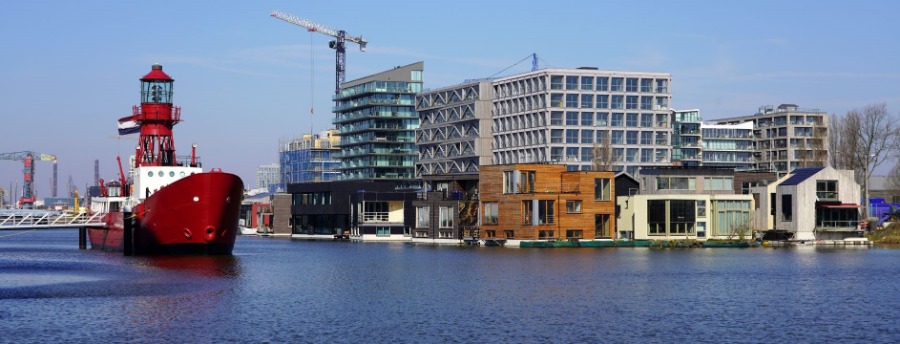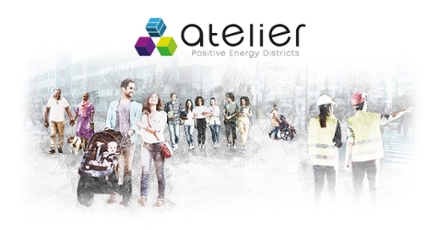AUAS realises positive energy districts throughout Europe
Where are we now? An update on developments in the European ATELIER project after a year and a half of research.
4 jun 2021 09:55 | Kenniscentrum TechniekA year and a half ago, Amsterdam received a European grant for the development of a positive energy district (PED) in the city. The result: Buiksloterham PED. The Centres of Expertise Urban Technology (CoE Urban Tech) and Urban Governance and Social Innovation (CoE UGSI) of Amsterdam University of Applied Science (AUAS) are leading five years of research into this new neighbourhood whose energy consumption will be covered by sustainable energy generated within the neighbourhood itself. How do things currently stand in this European project, known as ATELIER, and what knowledge has already been generated that Europe can benefit from?
With the first stone of Buiksloterham having already been laid in Amsterdam-Noord, AUAS researchers are working on the various activities that the project comprises. The researchers at CoE UGSI are developing the concept of “energy citizenship” and will be involving the future residents of the PED in their research. Steps have also been taken towards the establishment of PED Innovation Ateliers in eight collaborating cities across Europe. A local PED Innovation Atelier is being set up in each of these cities, creating a local innovation ecosystem in which smart solutions are collaboratively explored and tailored to the local situation and the implementation of these solutions is evaluated and facilitated to accelerate the establishment of PEDs in the city.
NEXT-LEVEL COLLABORATION
From the perspective of CoE UGSI, which has already acquired a great deal of experience with multidisciplinary processes, ATELIER really is an example of next-level collaboration, says researcher Marije Poel. “We have to really help each other understand which aspects of PEDs are interrelated and why: what do residents need to be able to live in a positive energy district? Are there technological innovations that require new skills, knowledge or behaviour on the part of residents? Will this encourage other sustainable habits? After a year and a half of work, we have an even better idea of what we want from a more social perspective and can research that and see how it affects the project as a whole. And that also gives us a better idea of how to evaluate the project’s social impact in the future.”
CoE Urban Tech’s attention is focused on various topics, one of which is impact assessment through energy system modelling. Are the PED demonstration projects truly energy-positive? “We are working on the modelling of the Amsterdam pilot project and its complex context,” says Renée Heller, Professor of Energy and Innovation. “Aside from that, we are studying potential future optimisations. Together with students in our Energy-Positive City minor programme, we have already explored initial ideas for other PEDS on non-greenfield sites in Amsterdam-Noord (greenfield projects are built on completely undeveloped land). The challenge now lies in scaling the project up to both brownfield situations (areas that are already developed to some extent) and other cities.”

Buiksloterham - photo from the City of Amsterdam
EUROPEAN COLLABORATION
Amsterdam is closely collaborating with the Spanish city of Bilbao (Lighthouse Cities), which is building a similar district to Buiksloterham. The other participating cities (Fellow Cities) are Bratislava, Budapest, Copenhagen, Cracow, Matosinhos and Riga. These cities will be putting the knowledge and experience from the innovations and techniques being developed to good use in their own future projects. The person in charge of organising this collaboration is Sara Rueda Raya (FME ): “The Fellow Cities are highly committed to the project: all the participating cities were present at the first to peer2peer sessions. However, getting all cities to actively participate in discussions and deliberations is not easy. I have noticed a distance, as it were, between certain cities, which may have to do with language barriers. This shows that we need to continue working on community building.”
STUDENT INVOLVEMENT AND TRAININGS BEING DEVELOPED
In the coming weeks and months, students from Utrecht University will be supporting the ATELIER team by means of a student consultancy project for the PED Innovation Ateliers. Seminars and trainings are also being developed for the Fellow Cities. Finally, AUAS also has responsibility for the evaluation of the activities and the project as a whole.
With its organisational complexity, ambitious objectives and multidisciplinarity, ATELIER is extremely challenging to manage, says project leader Mark van Wees. “All the more so because AUAS is all about innovation. There are moments where I feel like we are biting off more than we can chew, but most of the time I am really pleased with the enthusiasm of our AUAS team and the contributions we are making to the projects. Now, in the time to come, it’s our job to really deliver on these promises.”
More information
Members involved at CoE Urban Tech are Renée Heller, Karen Williams, Rick Wolbertus, Viktoria Balla-Kamper, Shakila Dhauntal, and Mark van Wees. The CoE UGSI team consists of Marije Poel, Beatriz Pineda Revilla, Loes Cremers, Stan Majoor, Willem van Winden, and Sara Rueda Raya.


